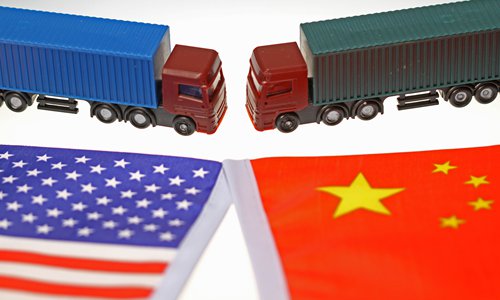HOME >> OPINION
US can’t bully China into submission: journo
Source:Global Times Published: 2019/7/8 16:55:31

Photo: IC
Editor's Note:
The US-launched trade war against China has hurt both countries and the rest of the world. Where is it heading? Is a China-US decoupling realistic? Global Times (GT) reporter Li Qingqing talked to Mian Abrar (Abrar), resident editor of Pakistan Today's Islamabad Bureau, on these issues. Abrar's research has focused on the China-proposed Belt and Road Initiative (BRI) and its flagship project the China-Pakistan Economic Corridor.
GT: Where is the current China-US trade war heading? Do you think Washington is expanding the trade war to other fields and trying to escalate it into a full-scale confrontation?
Abrar: A positive development has taken place as US President Donald Trump at the recent G20 summit hinted at not escalating the trade war against China. This is good news not only for China but also for global trade.
Having said this, I would reiterate that President Trump must review his decision of imposing unjustified tariffs on Chinese goods. This unilateral move reflects the traditional US arrogance which has hurt the world over the past few decades.
What the Trump administration needs to understand is that China is neither the Middle East nor Latin America or Africa. Rather, China is a new emerging powerhouse of the world. As the world's growth engine, China is a power to reckon with. China is a new phenomenon with its visionary President Xi Jinping galvanizing the world for a shared future for mankind.
So, the US policy of bullying and arm-twisting sovereign nations won't work against China. Better sense must prevail as this trade war may change into an all-out war anytime.
GT: The trade war will hurt global economic growth. Why is the US obsessed with a trade war even it may hurt all countries' interests, including Washington itself?
Abrar: Yes, the trade war is already hurting the US and the world. Initially, US policymakers must have believed that China's rise could be contained by putting sanctions on Chinese companies. The US might have thought that China could be dictated according to the whims and wishes of a few decision-makers in Washington DC.
However, the policymakers failed to comprehend that China had transformed from an underdeveloped country into the world's most promising economic powerhouse. Since Xi came to power, China has adopted globalization and launched the BRI to share the fruits of development with countries in the Middle East, Africa, Latin America, and other developed countries in the West.
The BRI is a comprehensive initiative with a multi-pronged strategy to expand China's outreach in economic, social, and foreign policy areas which has helped Beijing galvanize new partners in its globalization campaign. Not only has China embraced innovation and technological transformation, it has also adopted global resolutions on issues, especially climate change.
Hence, China found new partners in its pursuit of world support. The US is fast losing partners due to the deglobalization policies and unilateral actions taken by President Trump against sovereign nations. This is the reason frustrated Washington policymakers decided to ignite the trade war against China.
Only recently, President Trump had to announce subsidies for the US farming industry after China refused to budge under US diktats and retaliated with $60 billion in sanctions against US tariffs.
GT: How far are China and the US away from an agreement?
Abrar: I suppose the G20 summit helped both sides halt further escalation, and negotiations will soon be starting between China and the US. But let me make it clear that the trade war will not stop if the US administration doesn't wake up to this situation.
Washington needs to face reality. China can't be subdued or bullied. If the trade war escalates, it might ignite not only another world recession phase but also an all-out war.
GT: The US has been adding pressure on China's telecommunications giant Huawei. Some in the US have called for China-US decoupling in high-tech and other areas. Do you think a complete China-US decoupling is realistic?
Abrar: At the G20 summit, President Trump made another welcome statement that US companies would be allowed to sell high-tech components to Huawei. Huawei is a leader in the latest 5G mobile phone technology but the US says the company is a threat to US national security.
Trump said China will also be buying more US farm goods which is also a positive statement. As far as a decoupling of Chinese and US high-tech firms is concerned, I think it as an immature and unrealistic proposal.
GT: What should China do in the future to counteract US moves?
Abrar: China must take its partners over the situation and more information must be shared on the unilateral and unjustified actions the Trump administration has taken against China. Actually, it seems that Washington fears the fact that China would soon become a new superpower and hence the policymakers in Washington have been taking measures to isolate China.
Initially, the US had announced alliances with India, Japan, Philippines and other countries under its China containment policy which later backfired. After the BRI was proposed by President Xi, former US secretary of state Hilary Clinton launched the Pivot to Asia policy to contain China, which also failed.
Now, the US trade war is a desperate step that is also bound to fail. The US is losing partners one by one, and China is gaining on the foreign policy front due to its globalization policies. China needs to step up efforts to win more friends and ultimately the US will become further isolated. Trump needs to understand that China's rise is a reality and it can't be curtailed by unilateral sanctions, conspiracies, and acts of deceit.
Posted in: VIEWPOINT,DIALOGUE